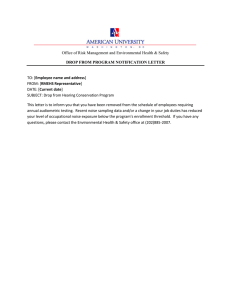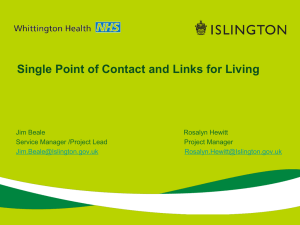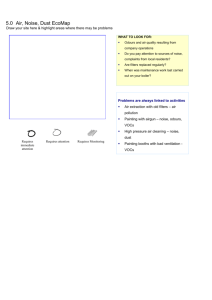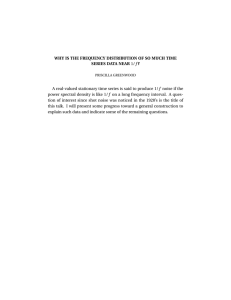Code of Construction Practice
advertisement
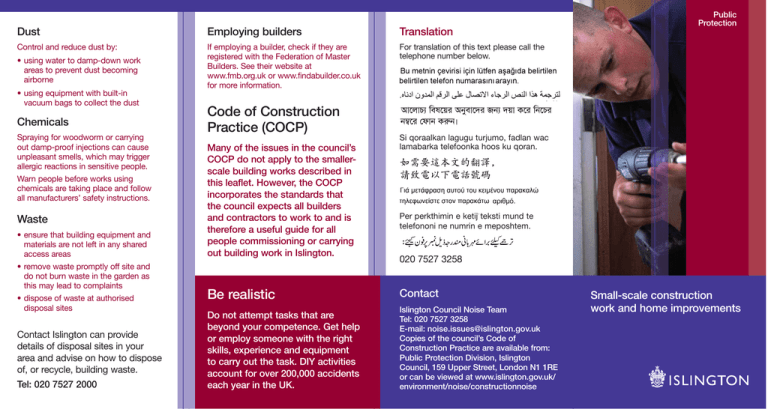
Dust Employing builders Translation Control and reduce dust by: If employing a builder, check if they are registered with the Federation of Master Builders. See their website at www.fmb.org.uk or www.findabuilder.co.uk for more information. For translation of this text please call the telephone number below. • using water to damp-down work areas to prevent dust becoming airborne • using equipment with built-in vacuum bags to collect the dust Chemicals Spraying for woodworm or carrying out damp-proof injections can cause unpleasant smells, which may trigger allergic reactions in sensitive people. Warn people before works using chemicals are taking place and follow all manufacturers’ safety instructions. Waste • ensure that building equipment and materials are not left in any shared access areas • remove waste promptly off site and do not burn waste in the garden as this may lead to complaints • dispose of waste at authorised disposal sites Contact Islington can provide details of disposal sites in your area and advise on how to dispose of, or recycle, building waste. Tel: 020 7527 2000 Code of Construction Practice (COCP) Many of the issues in the council’s COCP do not apply to the smallerscale building works described in this leaflet. However, the COCP incorporates the standards that the council expects all builders and contractors to work to and is therefore a useful guide for all people commissioning or carrying out building work in Islington. Public Protection Bu metnin çevirisi için lütfen aúa÷ıda belirtilen belirtilen telefon numarasını arayın. A¡Vm¡QÉ ¢hoVul Ae¤h¡Vcl SeÉ cu¡ LVl ¢eVQl eðVl ®g¡e Ll¦ez Si qoraalkan lagugu turjumo, fadlan wac lamabarka telefoonka hoos ku qoran. тᅮࢋώ͛۞ᖙᛌ-! ኛͽ˭ྖཱིቅ Per perkthimin e ketij teksti mund te telefononi ne numrin e meposhtem. :<y¯6, Ôsfzgqã!* $ñZ' , c3 F, 020 7527 3258 Be realistic Contact Do not attempt tasks that are beyond your competence. Get help or employ someone with the right skills, experience and equipment to carry out the task. DIY activities account for over 200,000 accidents each year in the UK. Islington Council Noise Team Tel: 020 7527 3258 E-mail: noise.issues@islington.gov.uk Copies of the council’s Code of Construction Practice are available from: Public Protection Division, Islington Council, 159 Upper Street, London N1 1RE or can be viewed at www.islington.gov.uk/ environment/noise/constructionnoise Small-scale construction work and home improvements Small-scale construction work and home improvements Before work begins tell your neighbours: Hours of working When hiring equipment, make sure you: Construction activities are an ongoing part of the regeneration process in Islington. Large-scale construction sites are required to work to the council’s Code of Construction Practice (COCP), which regulates hours of working and site management. • what work you are carrying out Most complaints received by the council are about the times during which building works are carried out. • only hire tools from a reputable supplier The council has powers under the Control of Pollution Act to restrict the hours of noisy working. Any subsequent work outside of these hours can result in prosecution and a fine of up to £5,000. • check that any guards or safety features are supplied and that you understand how to use them However, many owners and occupiers carry out their own building works or employ builders to do the work on their behalf. Often it is this type of building work that can cause the most annoyance to the local community, especially if it takes place at weekends or late in the evening. The council has powers to stop people causing unreasonable noise but owners and occupiers can avoid neighbours’ complaints by following the guidance outlined in this leaflet. Avoiding noise complaints The council’s Public Protection Division will investigate all complaints of unreasonable noise from construction activities. However by following some simple rules you may be able to avoid the occurrence of any complaints. • how long it should take • when you intend to work • when skips or material will be delivered Discuss with your neighbours what hours of work would best suit them. This may be different for: • shift workers • people with young children • people with medical conditions Agree working hours and stick to them. The council can take these discussions into account when specifying hours of work. The council can also specify other standards or conditions with which the builder or owner must comply. The council allows building works that generate noise to be carried out between the hours of: • 8am - 6pm, Monday to Friday • 8am - 1pm, Saturday • no audible building works to be carried out on Sunday or public holidays • ensure you read the instructions for usage and the safety instructions before you begin work and follow them carefully • use a circuit breaker on all electrical equipment • be careful not to lift loads beyond your strength and ensure that when lifting, you bend your knees and keep your back straight • get help to lift a heavy load or use a trolley or wheelbarrow Be considerate when using equipment: When using equipment: • when hiring or buying equipment check that it is the quietest available and make full use of any guards to further reduce the noise • wear a mask over your mouth and nose to prevent inhaling fine dust • warn your neighbours about very noisy operations, such as breaking up materials, and be clear how long it will go on for • build in breaks if the work will be going on for a number of hours or days Health and safety When planning your building work think of the risks that you, members of your household or members of the public may be exposed to. This might include poorly placed ladders, trailing leads and so on. • wear eye protection in case of splinters • wear ear protection if the activity is very noisy • wear gloves to protect your hands

